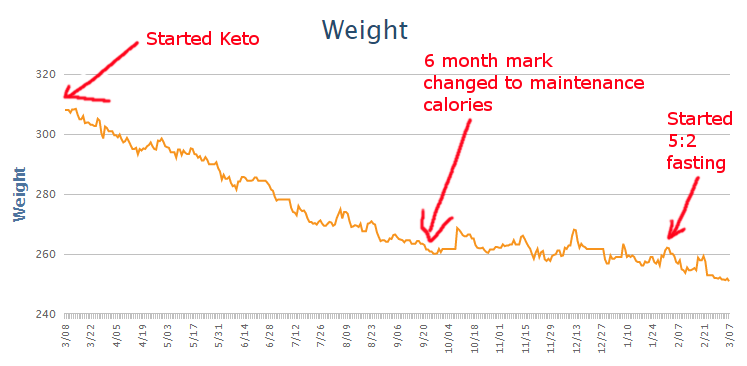TDEE
Your body has a certain amount of calories it needs every day just to keep you alive. This is your Total Daily Energy Expenditure (TDEE). These calories can come from the food you eat or from your fat stores. For the most part TDEE stays the same day-to-day but your body can adjust it over time by tuning your unconscious mechanisms (how often your heart beats, your core temperature, how often you breath, how much you fidget, etc). You can also consciously expend more calories through exercise (running laps, jumping jacks, climbing stairs, etc).
All weight loss comes from a calorie deficit. That is, when your calories coming in are less than your (TDEE + exercise) your body will pull those calories from fat stores. To that end, any diet that results in a calorie deficit will result in weight loss at least in the short term (<6 months).
Anyone who tells you differently is trying to sell you something.
Insulin is the culprit
When you eat, carbohydrates (and some of your proteins) get turned into glucose. Your body excretes insulin to instruct cells to store the glucose in the blood stream into fat stores. While you have sufficient (or excess) glucuse/insulin in the blood stream your body will NOT liberate energy from the stored fat cells. Put more simply, you can either be storing energy as fat or pulling energy out of fat but your body WILL NOT DO BOTH AT THE SAME TIME. In order to lose weight (liberate energy from fat cells) you need to be at a low insulin level.
Any diet can lead to weight loss.. so really the measure of an effective diet (in the first 6 months) is how well can you stick to it. I totally get that I’ve drank the coolaid.. but I have found that a low-carb diet yields the best results. My conclusion is based on the fact that I’m able to eat at a calorie deficit without feeling hungry, I don’t get an urge to nibble on a little something in the middle of the day, I’m not feeling significantly deprived, I have been able to significantly decrease my portions without feeling that I’m starving.
Hunger
For years I’ve had people rave about whatever new diet they’re on. “It’s great”, “it’s fantastic”, “I don’t even feel hungry”. That last part always confused me. “I don’t even feel hungry”. My experience with dieting is that I was always hungry. Practically starving except when I was sleeping. No matter what diet I tried I always felt hungry. Even when I gorged on carrot sticks and chicken broth and felt physically full I still felt starving. Having now followed the low-carb diet for the last year I have had an epiphany. Carbs make you hungry.. and cause you to nibble even when you’re not hungry. These nibbles add up and defeat your weight loss efforts OR the urge to nibble undermines your willpower making it impossible for you to follow your diet in the long term. I wrote a whole article about it here: “HUNGER: WHY AM I HUNGRY ALL THE TIME AND HOW TO MAKE IT STOP”
For the first time on a diet I can honestly say “I’m just not hungry” and actually mean it.
The short term:
I recommend cutting down on carbs (potatoes, sugar, flour, and processed foods especially). These are a significant source of glucose and keep your insulin high. I’ve followed the keto diet/low-carb diet for the last year and have lost 65 lbs. The diet is hard in that our society does not easily support this type of eating. I’m getting most of my carbs from vegetables.
The long term
The longer you follow a calorie deficit diet the more you body notices the new, now lower calories coming in. At about the 6-8 month mark your body starts taking drastic measures and begins reducing you TDEE so that it more closely matches your new-incoming calories. You feel tired, cold, you stop fidgiting. Your body adjusts to the new lower calories and in order to continue with the weight loss you have to further lower your incoming calories. So where you were comfortably losing weight at 1800 calories per day, now you see a stall (or a weight gain) at anything over 1600 calories per day. It’s a viscious cycle that eventually leads to the diet becoming unsustainable.
My recommendations:
Stick as hard as you can to whatever diet you follow for at least the first 6 months. This is where you’ll see the fastest and easiest weight loss. After that.. idaknow.
Possibility #1: I’ve read recommendations that you should cycle back to a higher level of calories and strive to maintain your weight loss at that higher calorie level. This should cause your body to again raise your TDEE so that at some later time you can try dieting again.
Possibility #2: I’ve also read interesting theories about 5:2 fasting. This is where you purposefully skip breakfast/lunch two non-consecutive days a week and eat only a regular sized dinner. This calorie cycling is supposed to fool your body into keeping your TDEE high even though your weekly calories are low. I’ve been doing this for the last month and a half and so far I’ve seen good success. I’ve also seen suggestions that you don’t have to wait for the big stall after 6 months to start 5:2 dieting. As long as your eating the other 5 days is reasonable.. then dropping you calories for 2 days a week should have a good impact on your weight.

My year of keto.
7-8 months of free fall weight loss. Mostly keto (<50g carb/day)
3-4 months of maintenance. A health scare put me off keto and I went to eating higher calories and more low-carb than strictly keto.
1.5 months of 5:2 fasting. Notice the dip there at the end. I’m currently on a losing streak.



